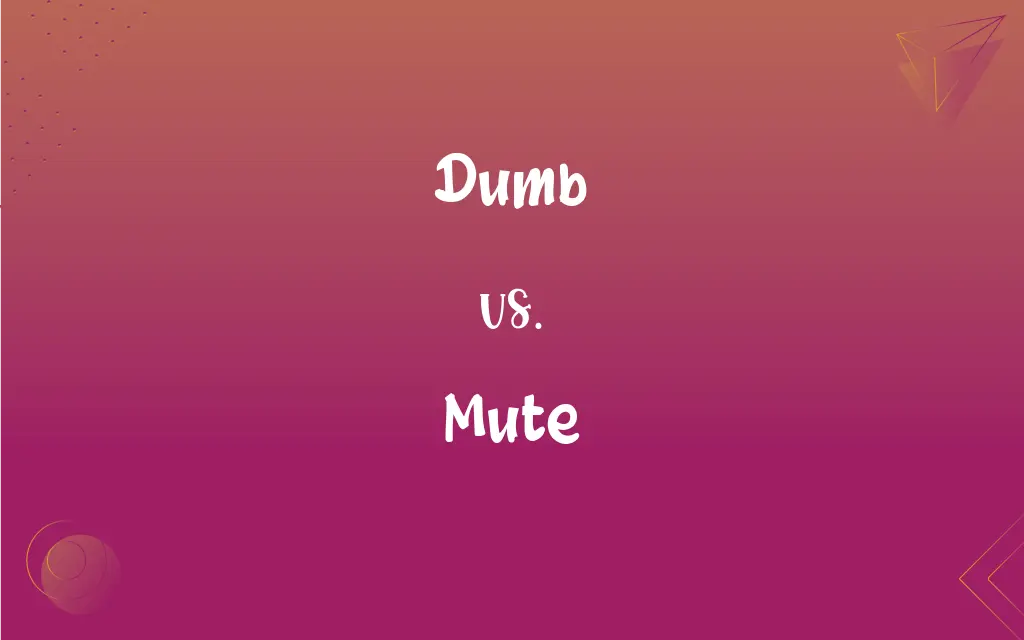Dumb vs. Mute: What's the Difference?
Edited by Aimie Carlson || By Janet White || Published on December 18, 2023
"Dumb" traditionally means unable to speak, often implying a congenital condition, whereas "mute" specifically refers to being silent, either by choice or inability.

Key Differences
"Dumb" was historically used to describe someone who was unable to speak, particularly due to a physical condition. "Mute" specifically refers to an individual who does not speak, which can be due to various reasons, including choice or physical inability.
The term "dumb" can carry an offensive connotation and is often avoided in modern language. "Mute" is generally considered a more appropriate and specific term, focusing on the lack of speech without implying other disabilities.
"Dumb" has evolved in colloquial use to mean lacking intelligence, a usage that is widely considered derogatory and insensitive. In contrast, "mute" is used in a literal sense to describe the absence of spoken words and is not associated with intelligence.
In literature, "dumb" is sometimes used for dramatic effect to denote silence or speechlessness in a situation. "Mute" is used to describe characters who are either unable or choose not to speak, with no implication of cognitive ability.
The use of "dumb" in the context of speech impairment is becoming increasingly rare and is being replaced by more specific and respectful terms. "Mute" remains a factual descriptor for the condition of not speaking and is preferred in clinical and formal contexts.
ADVERTISEMENT
Comparison Chart
Definition
Traditionally means unable to speak
Specifically refers to not speaking
Connotation
Often offensive, can imply stupidity
Neutral, relates only to speech
Usage Evolution
Now often means lacking intelligence
Remains specific to absence of speech
Contextual Use
Rarely used for speech impairment
Used in clinical and formal contexts
Literary Association
Sometimes denotes silence or awe
Depicts characters choosing not to speak
ADVERTISEMENT
Dumb and Mute Definitions
Dumb
Unable to speak.
He was born dumb and communicates through sign language.
Mute
Not speaking, silent.
The witness stood mute during the trial.
Dumb
Lacking the power of speech.
The shock left her temporarily dumb.
Mute
Unable to use speech.
The accident left him mute.
Dumb
Temporarily speechless.
His performance left the audience dumb in amazement.
Mute
Lacking the faculty of speech.
The mute character in the play communicated through gestures.
Dumb
Silent, uncommunicative.
He remained dumb during the interrogation.
Mute
Not expressed in spoken words.
His anger was mute but evident.
Dumb
Showing a lack of intelligence.
That was a really dumb decision.
Mute
Refraining from speech.
She chose to remain mute on the issue.
Dumb
Lacking the power of speech. Used of animals and inanimate objects.
Mute
Refraining from producing speech or vocal sound.
Dumb
(Offensive) Incapable of using speech; mute. Used of humans. See Usage Note at mute.
Mute
(Offensive) Unable to speak.
FAQs
What does 'mute' specifically refer to?
'Mute' specifically refers to an inability to speak, often due to physiological reasons.
What is the modern usage of 'dumb'?
In modern usage, 'dumb' often implies a lack of intelligence, which is also potentially offensive.
Is 'mute' considered offensive?
'Mute' is generally not offensive but using 'speech-impaired' or 'non-verbal' is more appropriate in certain contexts.
Can 'mute' also refer to a temporary condition?
Yes, 'mute' can describe someone temporarily unable to speak due to shock, trauma, or other reasons.
Can 'dumb' be used in a non-offensive way?
Yes, in phrases like 'struck dumb' (meaning shocked into silence), it's not offensive.
What does 'dumb' traditionally mean?
Traditionally, 'dumb' referred to the inability to speak.
Is the term 'dumb' considered offensive?
Yes, 'dumb' can be considered offensive when used to describe speechlessness. It's better to use 'mute' or 'speech-impaired'.
What are better alternatives to 'dumb' when referring to speech impairment?
'Speech-impaired', 'non-verbal', or 'unable to speak' are better alternatives.
What is the origin of the word 'mute'?
'Mute' originates from Latin 'mutus', meaning silent or speechless.
Can 'mute' be used metaphorically?
Yes, 'mute' can be used metaphorically to describe silence or lack of expression.
Is it okay to use 'dumb' in idiomatic expressions?
Caution is advised. Some idiomatic expressions with 'dumb' might be considered insensitive.
What is the origin of the word 'dumb'?
'Dumb' comes from Old English 'dumb', meaning unable to speak, akin to Old High German 'tumb'.
Can animals be described as 'mute'?
Yes, animals that do not make vocal sounds can be described as 'mute'.
Does 'dumb' have other meanings in English?
Yes, 'dumb' can also mean temporarily unable to speak or express oneself.
Is 'dumb' still used in legal or medical contexts?
No, 'dumb' is largely outdated and not used in modern legal or medical contexts.
Are 'dumb' and 'mute' interchangeable?
While they can be similar, they are not fully interchangeable due to 'dumb's' offensive connotations.
Does 'mute' imply a permanent condition?
Not necessarily. 'Mute' can refer to both temporary and permanent conditions.
Are there medical conditions associated with being mute?
Yes, conditions like aphasia, laryngeal cancer, or trauma can result in muteness.
Can 'mute' refer to non-verbal communication?
'Mute' specifically refers to the lack of spoken words, not the absence of communication.
How can I respectfully address someone who cannot speak?
Refer to them as 'non-verbal' or 'speech-impaired', and focus on their preferred means of communication.
About Author
Written by
Janet WhiteJanet White has been an esteemed writer and blogger for Difference Wiki. Holding a Master's degree in Science and Medical Journalism from the prestigious Boston University, she has consistently demonstrated her expertise and passion for her field. When she's not immersed in her work, Janet relishes her time exercising, delving into a good book, and cherishing moments with friends and family.
Edited by
Aimie CarlsonAimie Carlson, holding a master's degree in English literature, is a fervent English language enthusiast. She lends her writing talents to Difference Wiki, a prominent website that specializes in comparisons, offering readers insightful analyses that both captivate and inform.







































































